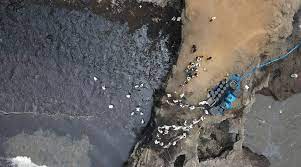Environmental Emergency In Peru:

The Peruvian government declared a 90-day “environmental emergency” in damaged coastal territories, after an oil spill that saw 6,000 barrels of crude oil pour into the sea.
- The spill was caused by freak waves, which resulted from the eruption of a volcano in Tonga.
- The oil spill came out of a tanker belonging to the Spanish energy firm Repsol.
- The incident occurred at the La Pampilla refinery, some 30 kilometers north of the Peruvian capital of Lima in the Ventanilla district of the port city of Callao.
- A freak wave or rogue wave is usually defined as a wave that is two times the significant wave height of the area.
- The significant wave height is the average of the highest one-third of waves that occur over a given period.
- Rogue waves can disable and sink even the largest ships and oil rigs.
- These so-called “freak waves” are not confined to the Atlantic Ocean or North Sea.
- One of the places rogue waves appear to happen most frequently is off the southeast coast of South Africa.
- An oil spill refers to any uncontrolled release of crude oil, gasoline, fuels, or other oil by-products into the environment.
- Oil spills can pollute land, air, or water, though it is mostly used for oceanic oil spills.
- Oil spills have become a major environmental problem, chiefly as a result of intensified petroleum exploration and production on continental shelves and the transport of large amounts of oils in vessels.
- Oil spills that happen in rivers, bays and the ocean most often are caused by accidents involving tankers, barges, pipelines, refineries, drilling rigs and storage facilities.




